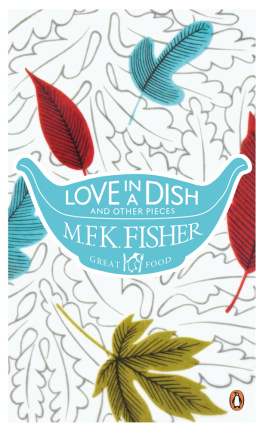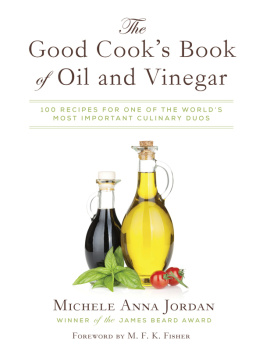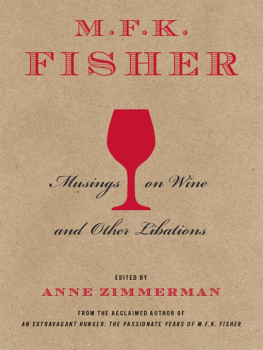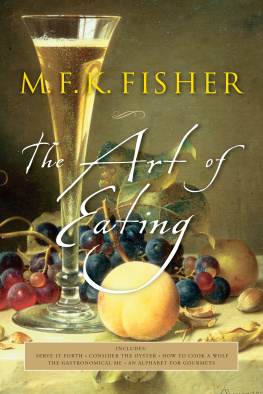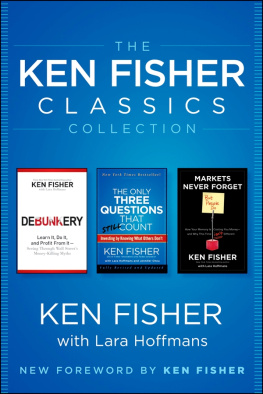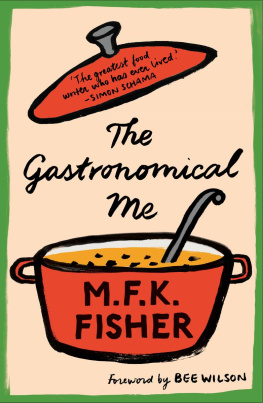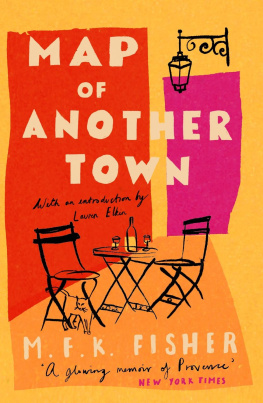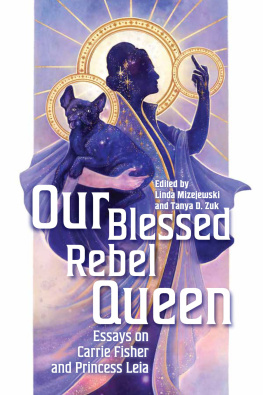Love in a Dish and Other Pieces
M. F. K. FISHER
Chosen by Anne Zimmerman
PENGUIN BOOKS
PENGUIN BOOKS
Published by the Penguin Group
Penguin Books Ltd, 80 Strand, London WC2R 0RL, England
Penguin Group (USA) Inc., 375 Hudson Street, New York, New York 10014, USA
Penguin Group (Canada), 90 Eglinton Avenue East, Suite 700, Toronto, Ontario, Canada M4P 2Y3 (a division of Pearson Penguin Canada Inc.)
Penguin Ireland, 25 St Stephens Green, Dublin 2, Ireland
(a division of Penguin Books Ltd)
Penguin Group (Australia), 250 Camberwell Road, Camberwell, Victoria 3124, Australia
(a division of Pearson Australia Group Pty Ltd)
Penguin Books India Pvt Ltd, 11 Community Centre, Panchsheel Park, New Delhi 110 017, India
Penguin Group (NZ), 67 Apollo Drive, Rosedale, Auckland 0632, New Zealand
(a division of Pearson New Zealand Ltd)
Penguin Books (South Africa) (Pty) Ltd, 24 Sturdee Avenue, Rosebank, Johannesburg 2196, South Africa
Penguin Books Ltd, Registered Offices: 80 Strand, London WC2R 0RL, England
www.penguin.com
This collection published in Penguin Books 2011
Copyright M. F. K. Fisher, c/o Robert Lescher, Trustee of the Literary Trust
All rights reserved
Cover design based on a pattern from a Century design side plate by Eva Zeisel for Hallcraft, 1957. Transfer-printed earthenware. (Photograph copyright Victoria & Albert Museum.) Picture research by Samantha Johnson. Lettering by Stephen Raw
Except in the United States of America, this book is sold subject to the condition that it shall not, by way of trade or otherwise, be lent, re-sold, hired out, or otherwise circulated without the publishers prior consent in any form of binding or cover other than that in which it is published and without a similar condition including this condition being imposed on the subsequent purchaser
ISBN: 978-0-14-196748-6
PENGUIN BOOKS GREAT FOOD
Love in a Dish and Other Pieces
MARY FRANCES KENNEDY FISHER (19081992) is considered one of the greatest American food writers of the twentieth century. In 1929, the newly married Fisher travelled with her husband to Dijon, in France, where she tasted real French cooking for the first time and learned how to live and eat well and economically. She returned in 1932 to an American appetite weakened by the Great Depression and began to write essays of her own. The author of many books, including the wartime classic How to Cook a Wolf, she aimed always to inspire cooks and combined recipes with reflection, anecdote and passionate storytelling. Considered the poet of the appetites by John Updike, and hailed by W. H. Auden as the greatest American prose writer, her culinary essays have become American classics.
Sources
Uncle Evans from To Begin Again: Stories and Memoirs 19081929 (Pantheon, 1992), copyright 1992 by the M. F. K. Fisher Literary Trust. I was Really Very Hungry from As They Were (Alfred A. Knopf, Inc., 1982), copyright 1982 by M. F. K. Fisher (originally appeared in The Atlantic Monthly). Let the Sky Rain Potatoes from Serve it Forth (Harper, 1937), copyright 1937, 1954, 2004 by M. F. K. Fisher. How Not to Cook an Egg from How to Cook a Wolf (Duell, Sloan & Pearce, 1942), copyright 1942, 1954, 2004 by M. F. K. Fisher. Love was the Pearl from Consider the Oyster (Duell, Sloan & Pearce, 1941), copyright 1941, 1954, 2004 by M. F. K. Fisher. G is for Gluttony from An Alphabet for Gourmets (Viking Press, 1949), copyright 1949, 1954, 2004 by M. F. K. Fisher (originally appeared in Gourmet). Once a Tramp, Always from With Bold Knife and Fork (Counterpoint, 1968), copyright 1968, 1969 by M. F. K. Fisher (originally appeared in The New Yorker). Love in a Dish from House Beautiful, May 1948. Reprinted with permission. Two Kitchens in Provence from As They Were (Alfred A. Knopf, Inc., 1982), copyright 1982 by M. F. K. Fisher (originally appeared in The New Yorker). Love Letter to an Empty Shell originally appeared in Travel and Leisure, copyright 1972 by M. F. K. Fisher. Wine is Life, copyright 1984 by M. F. K. Fisher, from the Preface to The Book of California Wine, ed. Doris Muscatine, Maynard A. Amerine and Bob Thompson (University of California Press/Sotheby Publications, 1984).
Uncle Evans
Uncle Evans was my mothers favorite brother and perhaps my fathers favorite man friend, and he was my favorite relative because he was worthy of all this family worship. He liked us, too, and spent many of his sabbaticals near us, writing unread law books. When I was eighteen he suggested, to my astonishment, that we travel together from California to Chicago, where he would go on eastward to his university post and I would go south to a small college. I now believe that he did this on purpose, to help me into new worlds.
It was my first train trip of more than three hours. I was dazed at escaping the family nest. My clothes were correctly navy-blue crepe de chine (because of the soot), and I slept in the upper berth because I was younger than my uncle. I spent most of my time on the observation platform or in the ladies room washing my hands. We met for lunch and dinner.
Uncle Evans was a seasoned commuter between West and East from the turn of the century until about 1940. He even had special clothes made for those gritty but delicious trips, as they were always called: odd-looking three-piece suits made of dirt-proof alpaca or something. (Only white shirts, of course, with starched collars: he was a professor.) The trains were good. He knew them. He knew the conductors and porters and dining stewards. He even knew the engineer.
In those days (1927 for my maiden voyage), the trains stopped often, and there were still a few Harvey Houses along the line. (The only test of a good breakfast place is its baked apple, Uncle Evans said mildly. The Harvey girls never fail me.) One time Uncle Evans walked me up to the engine at a desolate stop, and we stayed too long and were hauled up bodily into the cab until the next slowdown. It was exciting. And there were still prairie-dog huts along the track and conelike ovens in the westward country, in silent ugly Americanized villages that still dared not tell the Indians what kind of bread to bake.
As an old hand, Uncle Evans knew where to ask the dining-car steward to put on things like live trout, venison, fresh corn, melons. They were served to him at our twinkling, snowy little table in the restaurant car, at noon and at night, and I paddled along happily in the small sensual spree my uncle always made of his routine travelings. I probably heard and felt and tasted more than either of us could be aware of.
One time when he looked at me over his menu and asked me whether I would like something like a fresh mushroom omelet or one with wild asparagus, and I mumbled in my shy ignorance that I really did not care, he put down the big information sheet and for one of the few times in my life with him, he spoke a little sharply. He said, You should never say that again, dear girl. It is stupid, which you are not. It implies that the attentions of your host are basically wasted on you. So make up your mind, before you open your mouth. Let him believe, even if it is a lie, that you would infinitely prefer the exotic wild asparagus to the banal mushrooms, or vice versa. Let him feel that it matters to you and even that he does!
All this, my uncle added gently, may someday teach you about the art of seduction, as well as the more important art of knowing yourself. Then he turned to the waiter and ordered two wild asparagus omelets. I wanted for a minute, I still remember, to leave the dining car and weep a little in the sooty ladies room, but instead I stayed there and suddenly felt more secure and much wiser always a heady experience but especially so at nineteen. And I dont believe that since then I have ever said, I dont care, when I am offered a choice of any kind of food and drink. As Uncle Evans pointed out to me, I either care or Im a dolt, and dolts should not consort with caring people.

